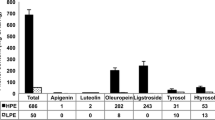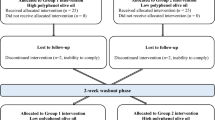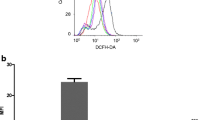Abstract
The protective effect of phenolic compounds from an olive oil extract, and of olive oils with (extra-virgin) and without (refined) phenolic components, on low density lipoprotein (LDL) oxidation was investigated. When added to isolated LDL, phenolics [0.025–0.3 mg/L caffeic acid equivalents (CAE)] increased the lag time of conjugated diene formation after copper-mediated LDL oxidation in a concentration-dependent manner. Concentrations of phenolics greater than 20 mg/L inhibited formation of thiobarbituric-acid reactive substances after AAPH-initiated LDL oxidation. LDL isolated from plasma after preincubation with phenolics (25–160 mg/L CAE) showed a concentration-dependent increase in the lag time of conjugated diene formation after copper-mediated LDL oxidation. Refined olive oil (0 mg/L CAE) and extra-virgin olive oil (0.1 and 0.3 mg/L CAE) added to isolated LDL caused an increase in the lag time of conjugated diene formation after copper-mediated LDL oxidation that was related to olive oil phenolic content. Multiple regression analysis showed that phenolics were significantly associated with the increase in lag time after adjustment for effects of other antioxidants; α-tocopherol also achieved a statistically significant effect. These results indicate that olive oil phenolic compounds protect LDL against peroxyl radical-dependent and metal-induced oxidation in vitro and could associate with LDL after their incubation with plasma. Both types of olive oil protect LDL from oxidation. Olive oil containing phenolics, however, shows more antioxidant effect on LDL oxidation than refined olive oil.
Similar content being viewed by others
Abbreviations
- AAPH:
-
2,2′-azobis(2-amidinopropane) dihydrochloride
- ANOVA:
-
analysis of variance
- CAE:
-
caffeic acid equivalents
- CHD:
-
coronary heart disease
- HPLC:
-
high-performance liquid chromatography
- IC:
-
inhibitory concentration
- LDL:
-
low density lipoprotein
- MDA:
-
malondialdehyde
- MUFA:
-
monounsaturated fatty acids
- PBS:
-
phosphate-buffered saline
- PUFA:
-
polyunsaturated fatty acids
- SFA:
-
saturated fatty acids
- TBARS:
-
thiobarbituric acid-reactive substances
References
Pérez, G., Pena, A., Sala, J., Roset, P., Masiá, R., and Marrugat, J. (1998) Acute Myocardial Infarction Case Fatality, Incidence and Mortality Rates in a Population Registry in Gerona, Spain, 1990–1992, Int. J. Epidemiol. 27, 599–604.
De Lorgeril, M., Salen, P., Martin, J.L., Monjaud, I., Delaye, J., and Mamelle, N. (1999) Mediterranean Diet, Traditional Risk Factors, and the Rate of Cardiovascular Complications After Myocardial Infarction. Final Report of the Lyon Diet Heart Study, Circulation 99, 779–785.
Renaud, S., de Lorgeril, M., Delaye, M., Guidollet, J., Jacquard, F., Mamelle, N., Martin, J.L., Monjaud, I., Salen, P., and Toubol, P. (1995) Cretan Mediterranean Diet for Prevention of Coronary Hearth Disease, Am. J. Clin. Nutr. 61, 1360–1365.
Witzum, J.L. (1994) The Oxidation Hypothesis of Atherosclerosis, Lancet 344, 793–795.
Mata, P., Alonso, R., López-Farré, A., Ordovas, J.M., Lahoz, C., Garces, C., Caramelo, C., Codoceo, R., Blazquez, E., and de Oya, M. (1996) Effect of Dietary Fat Saturation on LDL Oxidation and Monocyte Adhesion to Human Endothelial Cells in vitro, Arterioscler. Thromb. Vasc. Biol. 16, 1347–1355.
Wiseman, S., Mathot, J.N., de Fouw, N.J., and Tijburg, L.B. (1996) Dietary Non-tocopherol Antioxidants Present in Extra-Virgin Olive Oil Increase the Resistance of Low Density Lipoproteins to Oxidation in Rabbits, Atherosclerosis 120, 15–23.
Parthasaraty, S., Khoo, J.C., Miller, E., Barnett, J., Witzum, J.L., and Steinberg, D. (1990) Low-Density Lipoprotein Rich in Oleic Acid Is Protected Against Oxidative Modification: Implications for Dietary Prevention of Atherosclerosis, Proc. Natl. Acad. Sci. USA 87, 3894–3898.
Papadopoulos, G., and Boskou, D. (1991) Antioxidant Effect of Natural Phenols on Olive Oil, J. Am. Oil Chem. Soc. 68, 669–671.
Perrin, J.L. (1992) Les Composés Mineurs et les Antioxygènes Naturels de l'Olive et de son Huile, Rev. Fr. Corps Gras 39, 25–32.
Vinson, J.A., Jang, J., Dabbagh, Y.A., Serry, M.M., and Cai, S. (1995) Plant Polyphenols Exhibit Lipoprotein-Bound Antioxidant Activity Using an in vitro Oxidation Model for Heart Disease, J. Agric. Food Chem. 43, 2798–2799.
Frankel, E.N., Waterhouse, A.L., and Kinsella, J.E. (1993) Inhibition of Human LDL Oxidation by Resveratrol, Lancet 341, 1103–1104.
Visioli, F., Bellomo, G., Montedoro, G., and Galli, C. (1995) Low Density Lipoprotein Oxidation Is Inhibited in vitro by Olive Oil Constituents, Atherosclerosis 117, 25–32.
Miyake, Y., Yamamoto, K., Tsujihara, N., and Osawa, T. (1998) Protective Effects of Lemon Flavonoids on Oxidative Stress in Diabetic Rats, Lipids 33, 689–695.
Hollman, P.C.H., and Katan, M.B. (1997) Absorption, Metabolism and Health Effects of Dietary Flavonoids in Men, Biomed. Pharmacother. 51, 305–310.
Ishikawa, T., Suzukawa, M., Ito, T., Yoshida, H., Ayaori, M., Nishiwaki, M., Yonemura, A., Hara, Y., and Nakamara, H. (1997) Effect of Tea Flavonoid Supplementation on the Susceptibility of Low Density Lipoprotein to Oxidative Modification, Am. J. Clin. Nutr. 66, 261–266.
Bondia, E.M., Castellote, A.I., López, M.C., and Rivero, M. (1994) Determination of Plasma Fatty Acid Composition in Neonates by Gas Chromatography, J. Chromatogr. 658, 369–374.
López-Sabater, M.C., Satué, T., Gónzalez, M., and Agramont, A. (1995) α-Tocopherol Content in Trout Oil, Food Chem. 53, 67–70.
Manzi, P., Panfili, G., Esti, M., and Pizzoferrato, L. (1998) Natural Antioxidants in the Unsaponifiable Fraction of Virgin Olive Oils from Different Cultivars, J. Sci. Food Agric. 77, 115–120.
Singleton, V.L., and Ross, J.A. (1965) Colorimetry of Total Phenolics with Phosphomolybdic-Phosphotungstic Acid Reagent, Am. J. Enol. Vitic. 16, 144–158.
Betés-Saura, C., Andrés-Lacueva, C., and Lamuela Raventós, R.M. (1996) Phenolic in White Free Run Juices and Wines: Changes During Vinification, J. Agric. Food Chem. 44, 3040–3060.
Tsimidou, M., Papadopoulos, G., and Boskou, D. (1992) Determination of Phenolic Compounds in Virgin Olive Oil by Reversed-Phase HPLC with Emphasis on UV Detection, Food Chem. 44, 53–60.
Havel, R.J., Eder, H.A., and Bragdon, J.H. (1955) The Distribution and Chemical Composition of Ultracentrifugally Separated Lipoproteins in Human Serum, J. Clin. Invest. 34, 1345–1349.
Esterbauer, H., Striegl, G., Puhl H., and Rotheneder, M. (1989) Continuous Monitoring of in vitro Oxidation of Human Low Density Lipoprotein, Free Radical Res. Commun. 6, 67–75.
Nourooz-Zadeh, J., Tajaddini-Sarmadi, J., Ling, K.L.E., and Wolff, S.P. (1996) Low-Density Lipoprotein Is the Major Carrier of Lipid Hydroperoxides in Plasma, Biochem. J. 313, 781–786.
De Lorgeril, M., Salen, P., Martin, J.L., Monjaud, I., Boucher, P., and Mammelle, N. (1998) Mediterranean Dietary Pattern in a Randomized Trial: Prolonged Survival and Possible Reduced Cancer Rate, Arch. Intern. Med. 158, 1181–1187.
Trevisan, M., Krogh, V., Freudenheim, J., Blake, A., Muti, P., Panico, S., Farinaro, E., Mancini, M., Menotti, A., and Ricci, G. (1990) Consumption of Olive Oil, Butter and Vegetable Oils and Coronary Heart Disease Risk Factors, JAMA 263, 688–692.
Trichopoulou, A., Katsouyanni, K., Stuver, S., Tzala, L., Gnardellis, C., Rimm, E., and Trichopoulos, D. (1995) Consumption of Olive Oil and Specific Food Groups in Relation to Breast Cancer Risk in Greece, J. Natl. Cancer Inst. 87, 110–116.
Kris-Etherthon, P.M. (1999) Monounsaturated Fatty Acids and Risk of Cardiovascular Disease, Circulation 100, 1253–1258.
Price, J.F., and Fowkes, F.G.R. (1997) Antioxidant Vitamins in the Prevention of Cardiovascular Disease, Eur. Heart J. 18, 719–727.
Hollman, P.C.H., and Katan, M.B. (1997) Absorption, Metabolism and Health Effects of Dietary Flavonoids in Man, Biomed. Pharmacother. 51, 305–310.
Kerry, N.L., and Abbey, M. (1997) Red Wine and Fractionated Phenolic Compounds Prepared from Red Wine Inhibit Low Density Lipoprotein Oxidation in vitro, Atherosclerosis 135, 93–102.
Jialal, I., Norkus, E.P., Cristol, L., and Grundy, S.M. (1991) Beta-Carotene Inhibits the Oxidative Modification of Low-Density Lipoprotein, Biochim. Biophys. Acta 1086, 134–138.
Author information
Authors and Affiliations
Corresponding author
About this article
Cite this article
Fitó, M., Covas, M.I., Lamuela-Raventós, R.M. et al. Protective effect of olive oil and its phenolic compounds against low density lipoprotein oxidation. Lipids 35, 633–638 (2000). https://doi.org/10.1007/s11745-000-0567-1
Received:
Revised:
Accepted:
Issue Date:
DOI: https://doi.org/10.1007/s11745-000-0567-1




